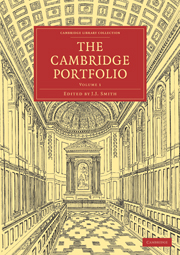Book contents
- Frontmatter
- DIRECTIONS FOR PLACING THE PLATES
- DESCRIPTION OF THE WOODCUTS
- LIST OF SIGNATURES
- ERRATA
- PREFACE
- INTRODUCTORY
- THE FIRST MILESTONE FROM CAMBRIDGE
- THE APPROACH AND PRINCIPAL AVENUE
- THE WALKS
- THE INSTALLATION IN 1835
- SOURCES OF HISTORY. I
- SOURCES OF HISTORY. II; COLLEGE HISTORIES
- A DREAM OF THE POETS
- MEMORIAL OF GONVILLE AND CAIUS COLLEGE
- FOVNDERS. I
- THE BOTANICAL GARDEN
- THE GOGMAGOGS
- TRINITY COLLEGE CHAPEL
- ON THE ANCIENT AMUSEMENTS OF THE UNIVERSITY
- A LEGEND OF THE HILLS
- SIGHED ON KING'S BRIDGE. OCT. 1838
- THE CAMBRIDGE PHILOSOPHICAL SOCIETY
- MUSEUM OF THE CAMBRIDGE PHILOSOPHICAL SOCIETY
- NOTICE OF WILLUGHBY
- THE BOAT-RACE
- NEVILLE'S COURT
- CRITIQUE ON GRAY
- AN INDEPENDENT TRIBUTE TO THE MEMORY OF THE RIGHT HON WILLIAM PITT
- SOURCES OF HISTORY. III: PRIVATE COLLECTIONS
- FOVNDERS. II
- PORTRAITURE OF DR. CAIUS
- THE UNION DEBATING SOCIETY
- ALABASTER
- CLARE HALL
- ORGANS
- POSTSCRIPT TO THE LEGEND OF THE HILLS
- ANECDOTES
- MILTON'S MULBERRY TREE
- BIOGRAPHICAL NOTICES
- The Cambridge Portfolio pp. 216-236
- VOCABULARY. I
- DR. LEGGE
- READING PARTIES
- THE CAM
- ANCIENT BRICK
- THE WOODWARDIAN MUSEUM
- THE COLLEGE COURSE
- THE CLUBS OF CAMBRIDGE
- OLD PLATE
- THE GARDEN AND COURTS OF GONVILLE AND CAIUS COLLEGE
- Plate section
- Frontmatter
- DIRECTIONS FOR PLACING THE PLATES
- DESCRIPTION OF THE WOODCUTS
- LIST OF SIGNATURES
- ERRATA
- PREFACE
- INTRODUCTORY
- THE FIRST MILESTONE FROM CAMBRIDGE
- THE APPROACH AND PRINCIPAL AVENUE
- THE WALKS
- THE INSTALLATION IN 1835
- SOURCES OF HISTORY. I
- SOURCES OF HISTORY. II; COLLEGE HISTORIES
- A DREAM OF THE POETS
- MEMORIAL OF GONVILLE AND CAIUS COLLEGE
- FOVNDERS. I
- THE BOTANICAL GARDEN
- THE GOGMAGOGS
- TRINITY COLLEGE CHAPEL
- ON THE ANCIENT AMUSEMENTS OF THE UNIVERSITY
- A LEGEND OF THE HILLS
- SIGHED ON KING'S BRIDGE. OCT. 1838
- THE CAMBRIDGE PHILOSOPHICAL SOCIETY
- MUSEUM OF THE CAMBRIDGE PHILOSOPHICAL SOCIETY
- NOTICE OF WILLUGHBY
- THE BOAT-RACE
- NEVILLE'S COURT
- CRITIQUE ON GRAY
- AN INDEPENDENT TRIBUTE TO THE MEMORY OF THE RIGHT HON WILLIAM PITT
- SOURCES OF HISTORY. III: PRIVATE COLLECTIONS
- FOVNDERS. II
- PORTRAITURE OF DR. CAIUS
- THE UNION DEBATING SOCIETY
- ALABASTER
- CLARE HALL
- ORGANS
- POSTSCRIPT TO THE LEGEND OF THE HILLS
- ANECDOTES
- MILTON'S MULBERRY TREE
- BIOGRAPHICAL NOTICES
- The Cambridge Portfolio pp. 216-236
- VOCABULARY. I
- DR. LEGGE
- READING PARTIES
- THE CAM
- ANCIENT BRICK
- THE WOODWARDIAN MUSEUM
- THE COLLEGE COURSE
- THE CLUBS OF CAMBRIDGE
- OLD PLATE
- THE GARDEN AND COURTS OF GONVILLE AND CAIUS COLLEGE
- Plate section
Summary
The method of associating for the attainment of any end, is so striking a feature of our time, that we are disposed to imagine it peculiar to ourselves. But this notion does some wrong to antiquity. This very point of association forms one link in a connected view of modern and ancient times.
One species of modern societies, the benefit clubs, seems to have had a prototype in the ancient gild. This name had its origin in the Saxon verb signifying to pay; and was applied to confraternities or bandships, made upon a religious basis and composed of nobility laity and their female relations. Having the patronage of some great man, the members wore a badge which was first defensive and later became offensive, for instance, a stout staff or club: and with these they were bound to defend or offend respectively those who were friends or foes of the fraternity. It is this duty that is signified by a custom yet lingering in the halls of some of our Colleges, which is for the two next in the progress of the cup down the table from one side to the other to be on their legs while the one who holds the cup is drinking to the toast. Numerous notices of these gilds lie scattered in topographical works. The statutes of several are preserved; and they supply some curious hints as to the character of these bodies.
- Type
- Chapter
- Information
- The Cambridge Portfolio , pp. 296 - 300Publisher: Cambridge University PressPrint publication year: 2010First published in: 1840



